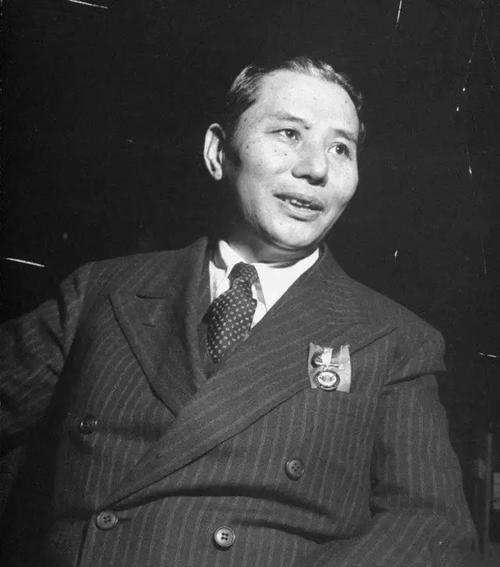Three days before Han Fuyu was shot, Liu Xiang died of illness at the Wuhan Wanguo Hospital. Just a stomach bleeding, it was pushed straight into the morgue, and the real cause of Liu Xiang's death is still a mystery.
But then again, to be fair, the grievances of that era, like the conflict between Han Fuyu and Chiang Kai-shek, were not personal problems. As the head of the Nationalist government, Chiang Kai-shek naturally did not want to be led by the nose by the semi-independent local warlords. However, the local warlords, who had always been a counter-offensive force, gradually dismantled Chiang Kai-shek's efforts.

From the depths of Chiang Kai-shek's heart, he was full of deep disgust for the old warlords and miscellaneous troops, and as a person, it was difficult for Chiang Kai-shek not to be swayed by emotions, such as giving 10 yuan to the central army in the care of the troops, and the local warlords may not even have 5 yuan. He was not at all at all unfair at this point, so the miscellaneous army again showed a tendency to centrifuge, and gradually formed a vicious circle.
At that time, this mixture of contradictions was not only Chiang Kai-shek, but also Yuan Shikai and Feng Yuxiang. Xiang Fuyu did not have a firm political belief, lacked a modern pattern, and did not have a sense of nationality, which was a fatal wound of the old soldiers at that time.
Before his death, Liu Xiang gave his subordinate Tang Shizun the position of commander of the 23rd Group Army in 1938, and the title of commander of the Seventh Theater of Operations also became a fictitious position. As I have introduced to you before, the combat scope of the Seventh Theater is: west of Taihu Lake in Jiangsu, southern Anhui, and northern Zhejiang.
After the fall of Nanjing, except for a few areas in Huizhou in southern Anhui, all the areas under the jurisdiction of its theater were occupied by the Japanese army, that is to say, the Seventh Theater of Operations had already existed in name only.
Faced with such a situation, Liu Xiang issued a secret order to Wang Zanxu: be prepared to lead troops to control Yichang, and according to the changes in the situation, block the central government from entering Sichuan.
Liu Xiang was also very risky in doing so, so that there were many versions of his death:
One version says it's actually scary to death.
He Yingqin was ordered by Chiang Kai-shek to visit him in the hospital and announced that Chen Cheng would be the commander of the Seventh Theater. Liu Xiang was overwhelmed, and when he learned about Han Fuyu, he asked in horror: Why did you arrest Han Fuyu? He Yingqin did not say that Han Fuyu disobeyed the order and retreated without authorization, but only replied: He wanted to take his troops to Xiangfan.
This sentence frightened Liu Xiang, and a few days later he died of excessive panic.
Another version says that he was poisoned by Dai Kasa's agents, and the last version died of normal illness.
However, due to the strict secrecy of some materials and the opening up to the outside world, Liu Xiang's death is still mysterious, but in the end, he died of natural illness, but it is the most untrustworthy one.
In any case, Liu Xiang's death was just right for Chiang Kai-shek.
There were more people spying on the chairman of Sichuan Province, such as Wang Longji, Wang Zanxu, Deng Xihou, Liu Wenhui, and so on, but Chiang Kai-shek naturally did not want to hand over Sichuan to local warlords. So he immediately sent Zhang Qun as the chairman of Sichuan Province, and then turned Wang Zanxu's troops into the 29th Group Army, and immediately went out of Sichuan to resist.
Although Zhang Qun was born in Sichuan, he had already been centralized, and as a close confidant of Chiang Kai-shek, as a close confidant of Chiang Kai-shek, he was opposed by the warlords of Sichuan, big and small, and even put up slogans demanding that "Sichuan people govern Sichuan" and launching the "Anti-Zhang Movement".
For a time, the situation in Sichuan and Xikang was very unstable.
At that time, Chiang Kai-shek had already decided to make Sichuan the rear area of the War of Resistance, and he was also worried that local conflicts would intensify and would be unfavorable to the war of resistance, so he had no choice but to take a step back and remove Zhang Qun.
Later, Chiang Kai-shek also wanted to borrow a donkey and wanted to appoint Wang Lingji as the chairman of Sichuan Province, but later found that Wang Lingji's prestige in Sichuan was not high, so he appointed him as the commander of the 30th Group Army and asked him to lead the Sichuan army out of Sichuan to fight.
Later, Chiang Kai-shek appointed Wang Zanxu, who was close to him, as the chairman of Sichuan Province, and transferred Deng Xihou to be the director of Chuankang Appeasement. However, it did not take long for Deng Xihou, Liu Wenhui, Pan Wenhua and other sichuan generals to join forces with Long Yun in Yunnan to launch an anti-Chiang movement.
One opposed Chiang Kai-shek's control of the southwest, and the other opposed Wang Zanxu's assumption of the chairmanship of Sichuan Province.
Wang Zanxu really had no choice but to take the army out of Sichuan to resist.
Since whoever holds the position, you all have one, then I will come myself, so he concurrently served as the chairman of Sichuan Province, until 1940, after the Nationalist government took root in Sichuan, Zhang Qun once again took office.